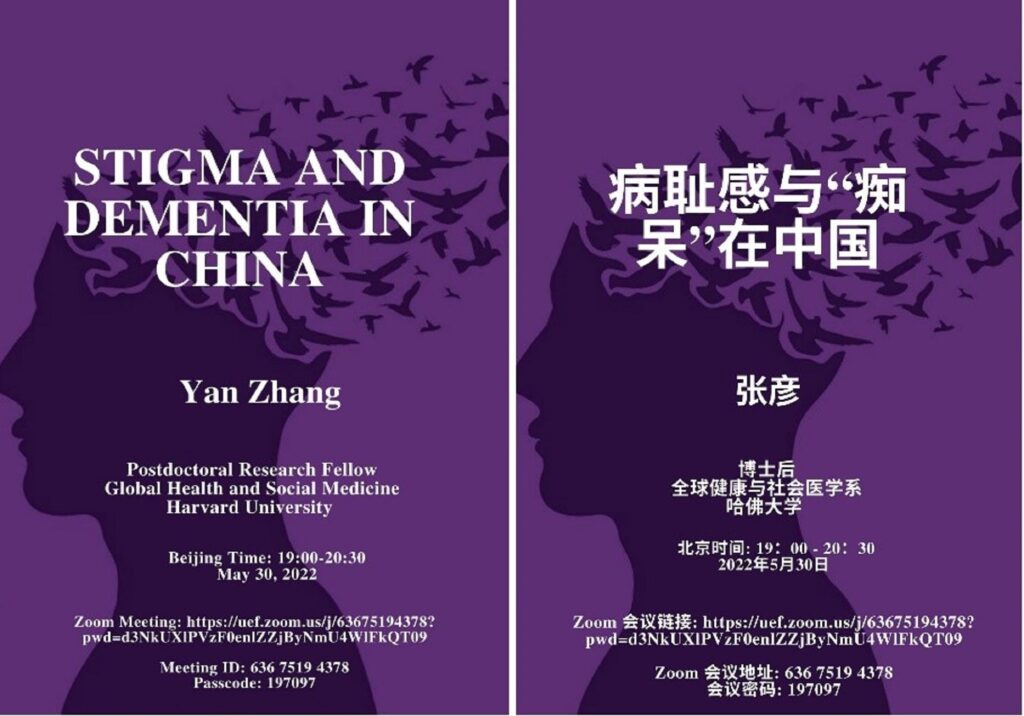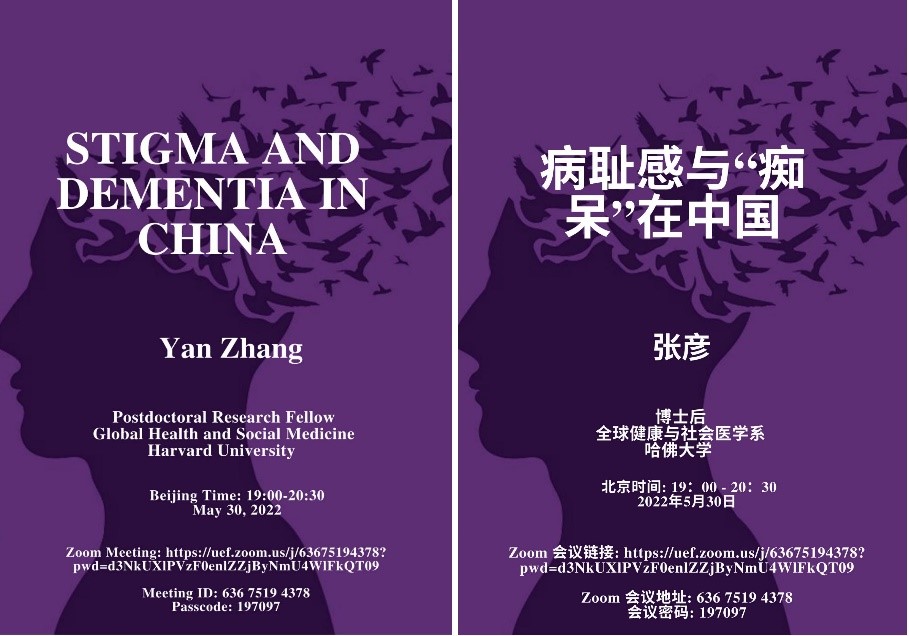
Engaged Anthropology Grant: Yan Zhang
Thanks to the Wenner-Gren Foundation for supporting this engaged project, though it happened online between May 1 and July 17. During this period of time, I accomplished three goals. Frist, I shared my research findings on the stigma with relevant stakeholders; second, I brought the voices of people with dementia and their family caregivers to the policymakers who had the authority to change the medical label of dementia; and lastly, I wrote two articles with the aims of raising public awareness of the stigma of dementia and of calling more attention to this public concern.
As for the first goal, I hosted an online meeting with Professor Honglin Chen, a scholar on social work of Fudan University, Shanghai. This meeting occurred on May 30th, with about 54 participants from different backgrounds: community service designers and providers, scholars and students on social work, and non-governmental organization managers who are promoting dementia-friendly communities in China.

During this meeting, I shared my research findings focusing on exclusively three issues: What is stigma? Causes and social effects of stigma; and the term “chidai” and its stigmatized effects to name dementia. Moreover, some service providers shared their experiences of encountering stigma when they used the negative term “chidai” in their programs. A non-governmental organization manager expressed that because of the stigma associated with “chidai,” they originally had a hard time to recruit participants. But, after she changed the term into others that implicitly denoted dementia conditions, participants started to actively join the team. After the meeting and our discussion, a student from Fudan University helped post it on a public account of WeChat, which was specially providing services for people with dementia and their family caregivers in China. You can find the content (in Chinese) here.

Regarding the second goal, I originally planned to host another online meeting with a group of medical experts on dementia care in China. However, due to the pandemic, these medical service providers were extremely busy with their own work and helping fight against Covid in their communities. So, I changed the formal online meeting to informal conversations via WeChat and emails. Specifically, I talked to Dr. Chunbo Li, the vice president of Shanghai Mental Healthcare Center, about the stigma of the medical label “chidai” on dementia and the possibility to change this derogatory term in medical training textbooks and other official documents. He recognized the persistent issue of stigma and stereotypes and would made efforts to change the term “chidai” in the new version of Chinese Classification of Mental Disorders, which followed the International Classification of Diseases – 11 (ICD-11).
After discussing the stigma of dementia, Dr. Li and I shifted our conversation to care, particularly how to mobilize social resources – not just medical ones – to improve the quality of care provided to people with dementia and/or other mental disorders. I introduced the concept of social medicine to Dr. Li, given that Harvard had established a robust curriculum on global health and social medicine in the medical school. We agreed that psychiatry should be considered as social medicine, not just biomedicine, and introducing the concept of social medicine to China, particularly to the medical schools, would be helpful to change the paradigms on care – not just forms of medical care but also social care. With the help of my postdoc supervisor, Dr. Arthur Kleinman, I organized a reading list for Dr. Li, hoping that our conversation would continue to put the ideas that we had exchanged to practice.
Last but not least, building upon my meetings and conversations with Professor Honglin Chen of Fudan University and Dr. Chunbo Li of Shanghai Mental Healthcare Center as well as other relevant scholars, students, and service providers, I wrote two journal articles on the issue of stigma and the name of dementia that enacts stigma, with one in Chinese, “Why Do We Still Use the Derogatory Term “Chidai” to Name Dementia in China?”, which is under review by Psychological Communications (xinlixue tongxun), a Chinese journal – and one in English, “Excess Stigma and Troubling Messaging: Debates about the Diagnostic Labels for Dementia in China” (co-authored with Dr. Arthur Kleinman), which will be submitted to Culture, Medicine, and Psychiatry for review soon. The two articles help further raise the public awareness of the stigma related to dementia and promote Dementia-Friendly Communities. Together with our individual and collective efforts to advocate on behalf of people with dementia and their family caregivers, this engaged project offers an opportunity to reshape the landscape of dementia care in China.
Overall, the grant provided by the Wenner-Gren Foundation helped me share my research findings, reconnect with relevant stakeholders, and put what we have done into formal journal articles. It allowed me to observe the ongoing change in the landscape of dementia care in China and the inevitable hurdles that stigma brought to the collective effort of building dementia-friendly communities in contemporary Chinese society.